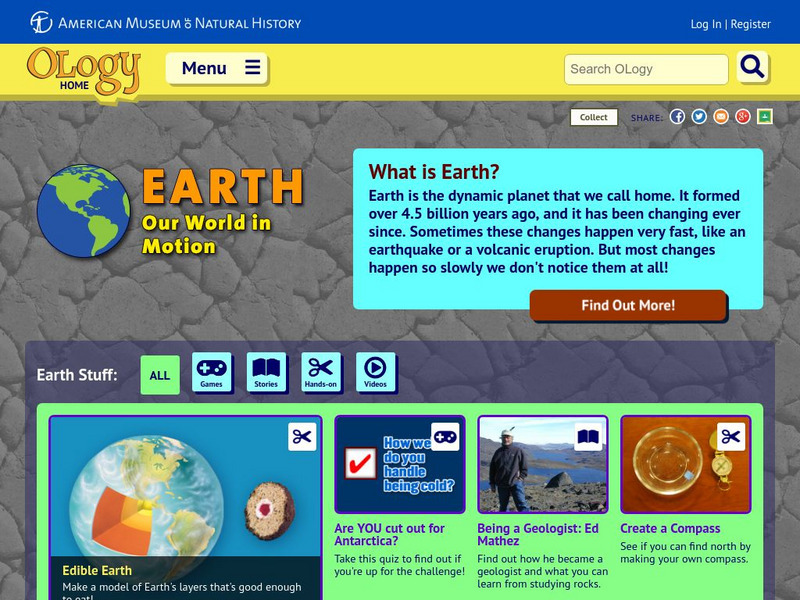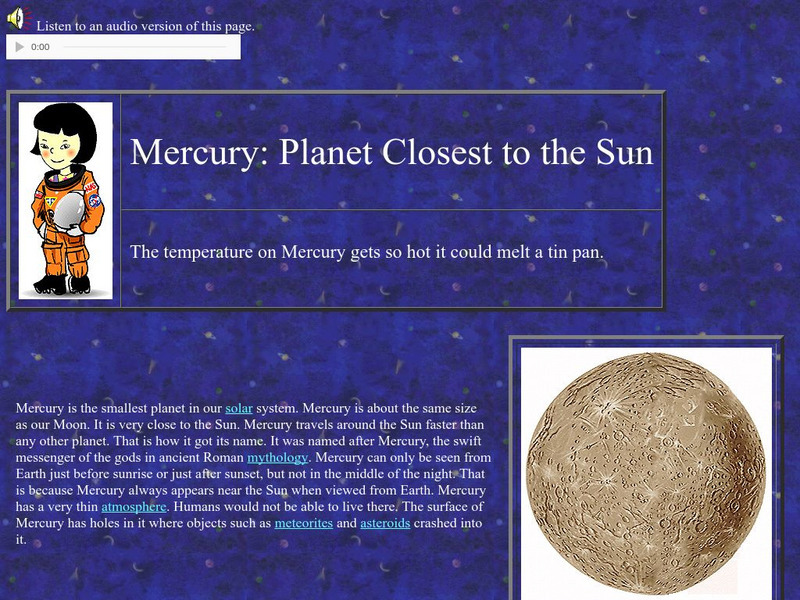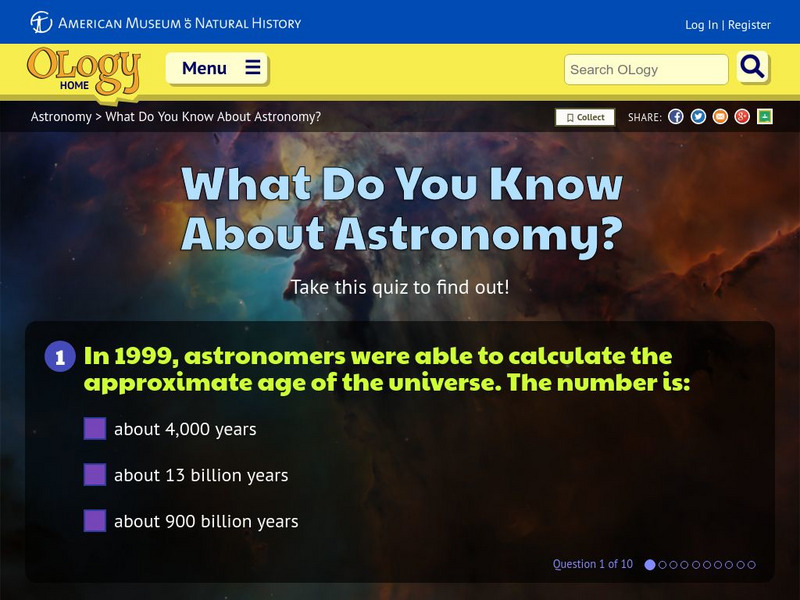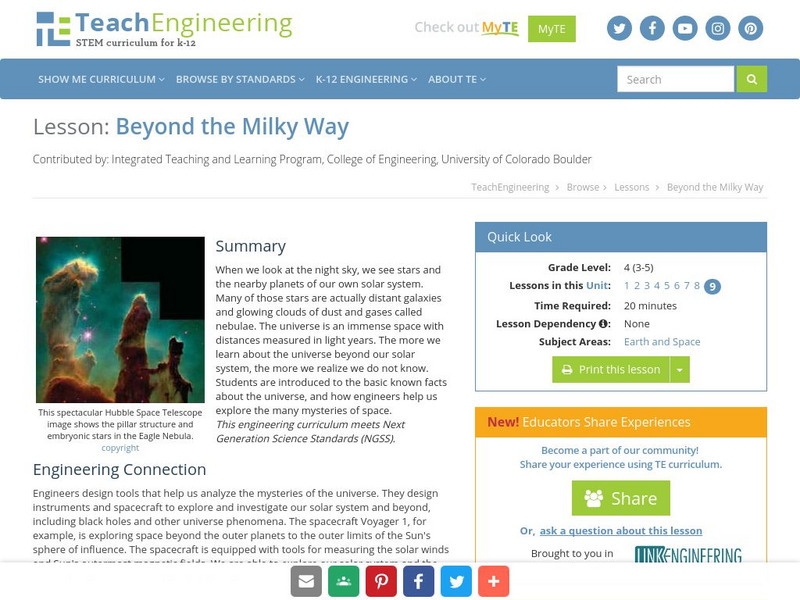Hi, what do you want to do?
Other
Kid Power: Astronomy for Kids
Young children can find facts about the Solar System, the Sun, meteorites, stars, galaxies, planets, our moon, comets, asteroids, and space exploration. Pages offer clear photos and bullet-point information, which is easy to read and...
Mocomi & Anibrain Digital Technologies
Mocomi: How Big Is the Universe?
Provides facts about the Universe, Jupiter, the Milky Way Galaxy, and Superclusters.
Mocomi & Anibrain Digital Technologies
Mocomi: What Is Solar System?
Features 10 fascinating facts about the solar system.
Cool Math
Coolmath: Science Monster: Mercury
A cool fact sheet about Mercury including a place for students to enter their weight on Earth to convert it to what it would be on Mercury.
Enchanted Learning
Enchanted Learning: Uranus
This comprehensive site provides a wealth of information about the seventh planet from the sun. Topics include rotational axis, size, mass and gravity, length of day, distance from the sun, and more. The information is supplemented with...
Cool Math
Coolmath: Science Monster: Uranus
A cool fact sheet about Uranus including a place for students to enter their weight on Earth to convert it to what it would be on Uranus.
Cool Math
Coolmath: Science Monster: Saturn
A cool fact sheet about Saturn including a place for students to enter their weight on Earth to convert it to what it would be on Saturn.
Cool Math
Coolmath: Science Monster: Neptune
A cool fact sheet about Neptune including a place for students to enter their weight on Earth to convert it to what it would be on Neptune.
Cool Math
Coolmath: Science Monster: Jupiter
A cool fact sheet about Jupiter including a place for students to enter their weight on Earth to convert it to what it would be on Jupiter.
PBS
Pbs: Tour the Solar System
Click on each space object to discover facts and other information about the many space objects that make up the solar system.
American Museum of Natural History
American Museum of Natural History: O Logy: Earth: Our World in Motion
This resource is a place for learning all about the Earth--the Earth's layers, its history, rocks and minerals, and interesting Earth science facts and discoveries. Explore, ask questions, find information, and meet American Museum of...
ClassFlow
Class Flow: What Happened to Pluto?
[Free Registration/Login Required] This flipchart was created to teach students about Pluto and the recent news of it NOT being a planet (officially). Lots of ways for students to vote on why as well as discussions about what other facts...
Science4Fun
Science4 Fun: Mars
Learn fun facts and details about the weather, geography, composition, and discovery of Mars, the fourth closest planet to the Sun.
NASA
Nasa Star Child: Mercury
Provides good information about Mercury and is a good starting point for information about the planet along with pictures and audio. Links to a simple fact table, puzzle, glossary, and more detailed information.
Science4Fun
Science4 Fun: Pluto
Learn fun facts and details about the atmosphere, geography, composition, and discovery of Pluto, a dwarf planet.
Science4Fun
Science4 Fun: Venus
Learn fun facts and details about the atmosphere, geography, composition, and discovery of Venus, the second closest planet to the sun.
Curated OER
Earth Man Teaches Planet Earth
Read interesting facts about the Earth on this fun, easy-to-read site.
American Museum of Natural History
American Museum of Natural History: O Logy: What Do You Know? Astronomy
Take this ten-question self-scoring quiz to test your knowledge of astronomy facts: age of the universe, why stars and planets are spheres, where other life might exist in the outer space, the Milky Way, and more.
Other
Perspective Periodicals: The Fungus Kingdom: Lichens
Lichens are one of the most fascinating organisms on this planet. If fact, they are actually composed of two organisms - a fungus and algae. Find out all the amazing facts about this interesting organism.
TeachEngineering
Teach Engineering: Beyond the Milky Way
When we look at the night sky, we see stars and the nearby planets of our own solar system. Many of those stars are actually distant galaxies and glowing clouds of dust and gases called nebulae. The universe is an immense space with...
Nature Canada
Nature Canada: Species Spotlight: Whooping Cranes
Although the whooping crane has survived for 3.5 million years, it has become endangered in the last few hundred due to human activities. At its lowest, there were only 15 on the whole planet. The number now stands at several hundred in...
University of Texas at Austin
The University of Texas Mc Donald Observatory: Comets
Discover interesting facts about comets, an icy time capsule left over from the birth of planets.
American Museum of Natural History
American Museum of Natural History: Craters O Logy Card
Flip this interactive card to start learning about craters. Answer multiple-choice and fact-or-fiction questions and review some fast facts.
Other
Water.org
Water plays a crucial role in the lives of every living being on Earth. Learn about how this essential resource is used across the planet each day, and how clean water is often difficult for many populations to obtain. Includes...














